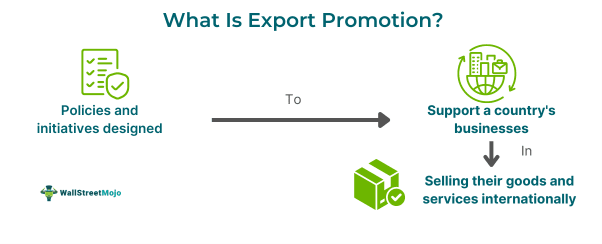Table of Contents
What Is Export Promotion?
Export promotion refers to policies and measures introduced to stimulate or boost a country's export activities. These public policies, regulated by governments, are designed to enhance export trading activities at the company, industry, or national level.

These promotion policies typically include tax exemptions, subsidies, and unique credit lines. Governments strive to implement the most effective measures and employ export promotion strategies to support economic growth, particularly in developing countries that rely heavily on export activities for their economic development. It is also known as export trade promotion.
Key Takeaways
- Export promotion involves government policies designed to stimulate the country's export activities, benefiting companies, industries, and national economic growth.
- Standard policies include the removal of trade barriers, tax exemptions, subsidies, memorable credit lines, and export incentive programs.
- Export promotion gained attention, especially after the Second World War, and became more regulated with the establishment of the World Trade Organization (WTO) in 1995.
- Increased exports help countries integrate into global markets and the global economy. This often involves bulk manufacturing, achieving economies of scale, and fostering overall economic growth.
Export Promotion Explained
Export promotion refers to government policies and measures designed to increase export trade activities within a country. It is a common practice among nations aiming to improve overall export performance to uplift the national economy. Its strategies often focus on industries with higher potential for competing in international markets and foreign trade. The goal is to increase the export of goods and services to foreign countries, involving bulk production and enabling companies to benefit from economies of scale.
The regulatory aspects changed significantly in the late 20th century with the establishment of the World Trade Organization (WTO) in 1995. The WTO identified some export promotion activities as trade-distorting practices and established rules and regulations for export promotion strategies, allowing countries affected by economic slowdowns to settle disputes. Its councils regulate policies and measures such as incentive programs, tax exemptions, subsidies, and unique credit lines, which are seen as complementary to import protection.
There are two essential interpretations of export promotion benefits. One has a laissez-faire bias, emphasizing minimal government intervention, while the other focuses on the role of state intervention in promoting exports. Many economists suggest that export promotion primarily positively impacts the economy's supply side. Although not a new concept, export promotion has been adopted and organized by almost all countries worldwide, particularly after World War II. Overall, it is crucial for developing countries to improve their production, manufacturing, and international exports.
Examples
Let's understand the concept with the help of hypothetical and real-world examples.
Example #1
Suppose in a fictitious country, the economy is rich in resources, but trade activities are low. The government introduces a tax exemption for companies in particular sectors after a certain threshold is met. In simple terms, the government will collect low or no taxes from organizations if they engage in export trading activities up to a certain level annually.
This policy will encourage companies to export their products and strive to exceed the government's set levels. At the same time, it will stimulate more business, market, and export activities, which will eventually help maintain or boost the national economy.
Example #2
The UAE and India made a pact on export promotion. The Agricultural and Processed Food Products Export Development Authority (APEDA), a government agency headquartered in India, signed a memorandum of understanding (MoU) with UAE-based global retail major LuLu Hypermarket to promote Indian agricultural products in the Gulf countries.
With this MoU, APEDA will promote Indian agricultural products across the Gulf Cooperation Council (GCC) member countries, with the LuLu Group already having a presence in Egypt and the Far East. The LuLu Group is the fastest-growing retail chain in Asia and the Middle East. Saudi Arabia, the UAE, Oman, Bahrain, Kuwait, and Qatar are members of the GCC. The LuLu Group will also assist in product labeling according to the requirements of different importing countries.
Importance
The importance of export promotion includes:
- Encouraging businesses and industries to increase the export of their products.
- Directly benefiting the trade balance and overall economy.
- Government-induced programs and policies offer better opportunities for companies to market their products internationally.
- Generating significant employment in countries rich in human capital through export promotion zones.
- Increasing foreign exchange inflow through higher exports.
- Helping small and developing countries to participate in global trade and maintain economic growth.
- Enabling nations to build better economic and political relationships through adherence to World Trade Organization (WTO) regulations.
Export Promotion vs Import Substitution
The critical differences between export promotion and import substitution are:
- Export promotion involves encouraging the export activities of goods and services through government policies. In comparison, import substitution focuses on replacing foreign goods with domestic products.
- In export promotion, the government provides certain benefits and incentives to companies to increase exports. In contrast, import substitution is employed when governments want to minimize their dependence on foreign countries by encouraging the production and consumption of domestic goods.
- Export promotion aims to sell domestic products in foreign markets. Conversely, import substitution promotes the production and consumption of domestic goods and services within the country.
